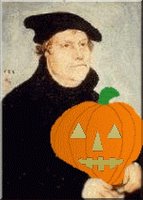 The Thirty-first of October is the Eve of All Saints, also known as All Hallows' Eve or Halloween. That means that the following day must be All Saints' Day (a remembrance of the martyrs and saints). The time of year was chosen in part to counter pagan festivals which focused on spiritism or witchcraft. These were common in much of Europe as non-Christians watched the lengthening of the night and the loss of daylight.
The Thirty-first of October is the Eve of All Saints, also known as All Hallows' Eve or Halloween. That means that the following day must be All Saints' Day (a remembrance of the martyrs and saints). The time of year was chosen in part to counter pagan festivals which focused on spiritism or witchcraft. These were common in much of Europe as non-Christians watched the lengthening of the night and the loss of daylight.Much of the costuming and carousing on Halloween may have roots in the practices of bygone ages, when Christians would mock Satan, to show that he had no power over Christ's Church. This mockery goes along with the thinking of Martin Luther, who had no doubts about Satan's existence but knew him as a strong enemy, yet one already defeated by Christ. He said of music, "I have no pleasure in any man who despises music. It is no invention of ours: it is a gift of God. I place it next to theology. Satan hates music: he knows how it drives the evil spirit out of us." Luther then also lauded laughter: "I often laugh at Satan, and there is nothing that makes him so angry as when I attack him to his face, and tell him that through God I am more than a match for him."
This gives us a nice segue into thoughts on the beginnings of the Evangelical (Gospel) movement, Lutheranism, and the Reformation: The Eve of All Saints is more than a night of extorting candy from our neighbor under threat of dire tricks. We Lutherans celebrate the All Hallows' Eve as Reformation Day.
We remember the Reformation's earliest hours with Martin Luther posting debate topics concerning abuses in Roman Catholicism on a church door. We ponder the spread of the Lutheran Reformation throughout Europe. In its wake, Roman Catholic domination of the continent crumbled, changing political and social boundaries. Most non-Roman Catholic churches in the West owe at least part of their existence to the Reformation or its aftermath.
Reformation Day is thus celebrated every 31 October as Lutherans mark the anniversary the 1517 posting of the Ninety-five Theses on a church door in Wittenberg, Saxony. While there had been divisions among Christ's followers from the time of Jesus' earthly life onward (see, for example, the conclusion of John 6), the Reformation marked one of the two great divisions in the Church. The other was the split between the eastern (Orthodox) and the western (Roman Catholic) churches.
While the first split still kept both sides relatively intact, the Reformation's aftermath more completely dissolved earthly unity. This was in part because of the times in which it came, with increasing nationalism and free-thinking stemming from the Renaissance. The Lutheran party was ejected from the Roman Catholic Church; others who disagreed with Rome but who did not agree with Luther joined the Lutherans for a time. Later, some of these would splinter off into other bodies. England, which was protected by water from threats of force, went its own way from the beginning. Yet the English (Anglican) Reformation also was divided for both doctrinal and political reasons.
Since it started with Luther — who built on the work of earlier theologians and reformers — the Lutheran Church has celebrated the day with more zeal than most. This can be positive, reminding us of the core reason why it all happened. Martin Luther was convinced that the saving Gospel of Jesus Christ was being obscured by legalism and empty, unchristian ceremonialism. Thus, when Christians gather to receive and rejoice in salvation by grace through faith in Christ, such celebrations are good.
However, when Lutherans or others use the day as one of empty boasting, of vainly over-trumpeting Luther, other reformers, and their followers, or by attacking and criticizing others save over important matters of doctrine and practice, they risk returning to the bondage of legalism that the Reformation sought to cast off. Likewise, well-meaning but misguided heirs to Luther do great harm when they throw out good ceremonies and traditions that the reformers kept, just because they think of them as being "too old-fashioned" or "too Catholic."
The heirs of the Gospel also place themselves back under God's law if they judge intent in others or if they take false pride in their heritage instead of holding true pride in the merits of Christ. They also create problems when they attack what is good in what other churches have kept simply because they disagree with part of what those churches teach.
Concerning today's illustration, a brother pastor in my circuit noted that Luther gets the credit for the widespread popularity of the Christmas tree. He figures that with this picture we might also be able to promote a folk belief that he introduced the Halloween jack-o'-lantern. This could have the collateral benefit of providing our church youth groups with a new source of income, October pumpkin sales.
Anyhow, in conjunction with the hat tips, the Ol' Aardvark now has a tangible receipt for the blogging labors of those mentioned in various praise posts and doffings of the chapeau. Yes, gentle reader (or Gentile reader, if that also fits), Aardvark Alley hereby unveils the Golden Aardvark Aaward, known in the vernacular as the Aardie.
"Aardie" is no mere nickname, but an acronym for all this honor represents: A.A.R.D.I.E. stands for the "Aardvark Aaward for Raillery, Doctrine, or Intellect in Exposition."
Note that two sizes are available, discreet (above) and "loud and proud" (right). The Ol' Aardvark leaves it to you to decide which to use and whether to place it in the body of the honored post, in a separate post, or in your blog's sidebar.
Please, if you clip the Aardie from me, please download it and please re-upload it to your own server: I'm hosting it at Xrysostom, the home site for Ask the Pastor and and don't want to burn bandwidth.
Of course, linking back to this post will always be appreciated.
‡ Props begin with a nod to the Rev. Bill Cwirla (rhymes with Cwirla), whose Blogosphere mixes preachments with regular episodes of Blogged Logic. Currently, he deals with the "Slippery Slope" Fallacy in Slip Sliding Away.
‡ You won't be Horn+Swoggled by the writing — if you arrive with a sense of humor. So look behind the Focus on the Family scenes with Dobson to Bush: Choose Jerry.
‡ Pastor Alms of incarnatus est makes his theological point regarding our fallen nature in The Sex Pistols, Sin, and Martin Luther.
‡ The Worthywoman of JustWords regularly takes us inside her world of living with a disability. How many of us could shrug off or laugh at her unexpected adventure if it happened to us?
‡ Young Maria's Musical Ramblings turn to the public square as she involves herself in a fundie-type rally, reminding you that You know it's fall when …
‡ Dan at Necessary Roughness, in his newly redone blog, compares refereeing to being a Supreme Court Justice in Here's Hoping for Impartiality.
‡ New team members are hopping and the oldtimers are brewing up more output at Purpose Driven Drinking. TK reminds us that Luther says, You may be exhilarated …
‡ And why are you asking, Jeff? Pastor Warner of Spirit and Life puzzles over the relative sinfulness of plagiarism and ghostwriting, asking, What's the Difference if Others Are Deceived?
‡ David Yow's Blog dusts off A Reformation Polka in time for you to memorize it by Monday.
Honorees may claim their Golden Aardvarks at any time.
 On the various New Testament lists of the Twelve Apostles (Matthew 10:2-4; Mark 3:16-19; Luke 6:14-16; Acts 1:13), the tenth and eleventh places are occupied by Simon the Zealot (also called Simon the "Cananean," the Aramaic word meaning "Zealot") and by Judas of James, also called Thaddaeus or Lebbaeus. Simon is not mentioned by name in the New Testament except on these lists.
On the various New Testament lists of the Twelve Apostles (Matthew 10:2-4; Mark 3:16-19; Luke 6:14-16; Acts 1:13), the tenth and eleventh places are occupied by Simon the Zealot (also called Simon the "Cananean," the Aramaic word meaning "Zealot") and by Judas of James, also called Thaddaeus or Lebbaeus. Simon is not mentioned by name in the New Testament except on these lists.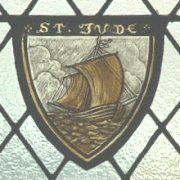 Judas (often called Jude in English) is variously named, but this is not surprising. Before the Crucifixion, there would be a need to distinguish him among the apostles from Judas Iscariot, and after the Crucifixion there would be an additional reason for being emphatic about the distinction. After the Last Supper it was Jude who asked Our Lord why he chose to reveal Himself only to the disciples. He received the reply: "If anyone loves me, he will keep my word, and my Father will love him, and we will come to him and make our home with him. (John 14:22ff)"
Judas (often called Jude in English) is variously named, but this is not surprising. Before the Crucifixion, there would be a need to distinguish him among the apostles from Judas Iscariot, and after the Crucifixion there would be an additional reason for being emphatic about the distinction. After the Last Supper it was Jude who asked Our Lord why he chose to reveal Himself only to the disciples. He received the reply: "If anyone loves me, he will keep my word, and my Father will love him, and we will come to him and make our home with him. (John 14:22ff)"Lection
Psalm 119:73-80
Jeremiah 26:1-16
1 John 4:1-6
John 14:21-27
Collect
O almighty God, whose Church is built on the foundation of the apostles and prophets, Jesus Christ Himself being the chief Cornerstone, grant us to be joined together in unity of spirit by their doctrine that we may be made a holy temple acceptable in Your sight; through Jesus Christ, Your Son, our Lore, who lives and reigns with You and the Holy Spirit, one God, now and forever.
The Life of a Pastor's Wife at Lonesome Grove and Something Fishy have both gone 404. Pastor Johnston is pulling the plug on Preach Teach Confess because, it seems, no one but he had been posting on this "team" blog. He also stopped Tail Feathers and All but reconsidered. If you appreciate his writings as much as I do, drop by and leave him a comment.
There may be a couple other blogs whose names will leave the roll if they don't post by All Saints Day.
Meanwhile, I've discovered two new confessional Lutheran bloggers. Kent Peck posts his musings from seminary at Yada Yada Yada. And at Indiana Jane's Journal, you can meet a coffee-loving writer, wife, home-schooling mother, and all-around interesting person.
Philipp Nicolai: 26 October AD 1608
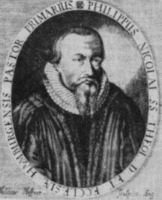 Nicolai was born in Waldeck, Germany 10 August 1556, the son of a Lutheran pastor. He entered the University of Erfurt and in 1576 he went to Wittenberg. For four years after his graduation, he lived at Volkhardinghousen and frequently preached for his father. In 1583, he was appointed Lutheran preacher at Herdecke, but because of a Roman Catholic town council, he found many difficulties there Following an invasion by Spanish troops in April 1586, a colleague re-introduced the Mass and Nicolai resigned his call.
Nicolai was born in Waldeck, Germany 10 August 1556, the son of a Lutheran pastor. He entered the University of Erfurt and in 1576 he went to Wittenberg. For four years after his graduation, he lived at Volkhardinghousen and frequently preached for his father. In 1583, he was appointed Lutheran preacher at Herdecke, but because of a Roman Catholic town council, he found many difficulties there Following an invasion by Spanish troops in April 1586, a colleague re-introduced the Mass and Nicolai resigned his call.In the end of 1586 he was appointed diaconus at Niederwildungen, near Waldeck and became pastor in 1587. In November 1588, he became chief pastor at Altwildungen, court preacher to the widowed Countess Margaretha of Waldeck, and tutor to her son, Count Wilhelm Ernst. He found himself in disagreement with Calvinists on the meaning of the Lord's Supper and worked toward having principality's clergy adopt the Formula of Concord.
He went to Unna in Westphalia in 1596 which led to more controversy with the Calvinists. Unna fell victim to the plague in 1597 and 1598, which took the lives of 1,300 of its inhabitants. From the parsonage which overlooked the churchyard, Nicolai was saddened by the continual burials. On one day thirty graves were dug. In the midst of this distress he wrote a series of meditations which he titled, Freuden Spiegel ("Mirror of Joy"). These writings Nicolai look to the hope of eternal life in Christ. On 27 December 1598, Nicolai fled before the invasion of the Spaniards, not returning until the end of April 1599. During this time Nicolai prepared his Frewden-Spiegel dess ewigen Lebens ("Joyful Mirror of the Eternal Life.")
In April 1601, he was elected chief pastor of Saint Katherine's Church, Hamburg, beginning his duties on 6 August. Life passed without many recorded incidents until 22 October 1608, when he participated in an ordination and returned home feeling ill. He developed a violent fever, dying 26 October 1608.
While in Hamburg, Nicolai gained fame for his preaching, often hailed as a "second Chrysostom." Still, we remember him most for his hymns. Of them, only four seem to have been published. These "Jesus hymns" began a new era of hymn writing in the 17th Century. Published only a few years before Johann Arndt's True Christianity, they show a similar devotional feeling toward Jesus.
Johann Heermann: 17 February AD 1647
 Johann Heermann, considered the greatest Lutheran chorale writer between Luther and Gerhardt, was influenced by Valerius Herberger, writer of the hymn, Valet will ich dir geben. Heermann was born in Silesia, studied in Leipzig, Jena, and Strasbourg, and was called to be pastor in Köben in 1611. He contracted tuberculosis in 1634 and resigned his pastorate in 1638 because of declining health. He moved from there to Lissa, Poland, dying nine years later.
Johann Heermann, considered the greatest Lutheran chorale writer between Luther and Gerhardt, was influenced by Valerius Herberger, writer of the hymn, Valet will ich dir geben. Heermann was born in Silesia, studied in Leipzig, Jena, and Strasbourg, and was called to be pastor in Köben in 1611. He contracted tuberculosis in 1634 and resigned his pastorate in 1638 because of declining health. He moved from there to Lissa, Poland, dying nine years later.Many of Heermann's hymns were written for family devotions, so much of his output was based on Johann Arndt's Paradies Gärtlein ("Garden of Paradise"). His life was filled with suffering and sadness. During the Thirty Years War, he lost everything he owned three times. His first wife died young, he developed chronic sinusitis and bronchitis, rendering him unable to speak any length without terrible coughing. In spite of this, he helped his parishoners deal with their own difficulties as they, along with him, lost everything in war, pestilence and plague. After moving to Poland on the advice of his doctor son-in-law, he was built a small home. However, his sufferings overwhelmed him more and more. By the end of his life, he could neither sit or lie down, and slept while leaning against a wall.
In spite of his afflictions, he continued writing hymns of praise and comfort. Many consider his famous "Ah! Holy Jesus" to be among the finest of all passion hymns. His writing, rooted in the Jesus mysticism of the Middle Ages, is thought to have been one of the sources for the Pietist movement.
Paul Gerhardt: 27 May AD 1676
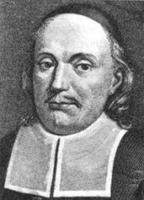 Paul Gerhardt was dubbed the "sweet singer of Lutheranism." He was born on 12 March 1607 in Gräfenhaim, near Wittenberg and lived during the religious wars of the 17th century. He received training as a Lutheran pastor at Wittenberg, where Martin Luther had taught a century before. However, Gerhardt didn't receive a call to a church until 1651, when he was ordained to serve the congregation in Mittenwalde, southeast of Berlin.
Paul Gerhardt was dubbed the "sweet singer of Lutheranism." He was born on 12 March 1607 in Gräfenhaim, near Wittenberg and lived during the religious wars of the 17th century. He received training as a Lutheran pastor at Wittenberg, where Martin Luther had taught a century before. However, Gerhardt didn't receive a call to a church until 1651, when he was ordained to serve the congregation in Mittenwalde, southeast of Berlin.While awaiting a call, he taught the children of Andreas Barthold — one of whom, Anna Maria, he later married. During that time he met Johann Crüger, the kantor and organist of Saint Nicholas Church, Berlin. Together they produced some of the greatest Lutheran chorales, including "Awake, My Heart with Gladness," (Auf, auf, mein Herz), "Now All the Woods Are Sleeping," and "All My Heart this Night Rejoices," among others.
Gerhardt's hymns combine a strong, objective faith in justification as a free gift from God with his own warm, subjective experience of that gift. In all, he wrote more than 120 hymns, many of which are still known and loved throughout the world.
His life, however, was difficult. He suffered greatly because of the religious wars. When asked to refrain from preaching against Calvinism by Elector Friedrich Wilhelm of Prussia, conscience would not allow him to compromise his Lutheran beliefs. He was soon deposed from office and barred from holding services even in his own home. During this time his wife and one son died, leaving him alone with a boy of six.
In May 1669, the congregation in Lübben, near the southeastern border of Germany, called him as pastor. He served there until his death on 27 May 1676. The Lübben congregation commissioned a life-sized painting of him for the church and in 1930, following renovation, the church was renamed Paul-Gerhardt-Kirche in his honor. The painting still hangs there. Beneath it is inscribed a fitting epitaph: "A theologian sifted in Satan's sieve."
Lection
Psalm 40
Deuteronomy 31:30-32:47
Colossians 3:12-17
John 16:16-24
Collect
Almighty God, through your holy apostle You taught us to praise You in psalms and hymns and spiritual songs; we give You thanks this day for the gift of hymn writing which confesses the Faith and inspires the faithful which You gave to Your servants Philipp Nicolai, Johann Heermann, and Paul Gerhardt, and we pray that Christ's Church may never lack those with the gifts of writing words and music to Your praise. May the Church be ever filled with the desire to praise and thank You for your grace, mercy, and faithfulness; through Jesus Christ, Your Son, our Lord, who lives and reigns with You and the Holy Spirit, one God, now and forever.
Lection and collect added to original post.
Thanks to Madre, I found and took the following quiz. My main problem was in only being allowed one answer for the fourth question. At least half of them were true for me. However, as I tested the alternatives, all pointed down the same path: Liberal Arts, here I come (again)!
I guess this means that my BA in Humanities already matched my Inner Aardvark.
You Should Get a PhD in Liberal Arts (like political science, literature, or philosophy) |
You're a great thinker and a true philosopher. You'd make a talented professor or writer. |
These women were exemplary Christians who demonstrated their faith by their material support of the Church.
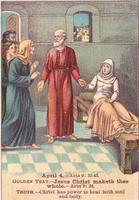 Dorcas (or "Tabitha," both names meaning "gazelle") was well-known and much loved for her acts of charity in the city of Joppa, especially for her making clothes for the poor. When Dorcas died suddenly, the members of her congregation sent to the neighboring city of Lydda for the Apostle Peter, who came and raised her from the dead (Acts 9:36-43).
Dorcas (or "Tabitha," both names meaning "gazelle") was well-known and much loved for her acts of charity in the city of Joppa, especially for her making clothes for the poor. When Dorcas died suddenly, the members of her congregation sent to the neighboring city of Lydda for the Apostle Peter, who came and raised her from the dead (Acts 9:36-43).Lydia was a woman of Thyatira, who worked at Philippi selling a famous purple dye that was so much in demand in the ancient world. She was also a "worshiper of God," most likely at a local synagogue . When the Apostle Paul encountered her in prayer among other proselyte women, his preaching of the Word brought Lydia to faith in Christ. She and her friends thus became the nucleus of the Christian community in Philippi (16:11-15). It was to her house that Paul and Silas returned following the conversion of the Philippian jailer (16:16-40).
Phoebe was another faithful woman associated with the Apostle Paul. She was a church servant (perhaps "deaconess") from Cenchrae (the port of Corinth) whom Paul sent to the church in Rome with his Epistle to the Romans. In it he writes of her support for the work of the early Church (Romans 16:1-2).
Illustration is a public domain Bible card from 1897. To find similar cards and other illustrations, please follow the clipart link from The Bread Site.
Lutheran Carnival IX is now hot off of the presses at Be Strong in the Grace.
 The New Testament refers to this James as the brother of Jesus (Galatians 1:19). He led the Christian congregation in Jerusalem for many years, and is generally supposed to be the author of the Epistle of James, although the Epistle itself does not state this explicitly.
The New Testament refers to this James as the brother of Jesus (Galatians 1:19). He led the Christian congregation in Jerusalem for many years, and is generally supposed to be the author of the Epistle of James, although the Epistle itself does not state this explicitly.James is mentioned briefly in connection with Jesus' visit to Nazareth (Matthew 13:55; Mark 6:3). John 7:2-5 tells us that Jesus' brothers did not believe in Him and from this, as well as references in early Christian writers, we infer that James was not a disciple of until after the Resurrection. When Paul lists our Lord's resurrection appearances (1 Corinthians 15:3-8), he includes an appearance to James. Peter, about to leave Jerusalem after escaping from Herod, left a message for James and the Apostles (Acts 12:17). When a council met at Jerusalem to consider what rules Gentile Christians should be required to keep, James formulated the final consensus (Acts 15:13-21).
On his last recorded visit to Jerusalem, Paul visited James (others were present, but no other names are given) and spoke of his ministry to the Gentiles (Acts 21:18).
Outside the New Testament, the Jewish historian Josephus called James "the brother of Jesus the so-called Christ," and reported that even the Pharisees greatly respected his piety and strict observance of the Law but that his enemies took advantage of an interval between Roman governors in AD 62 to have him put to death. Numerous references in early Christian documents also show the esteem with which the early Church held him.
For a bit more on James' possible blood relationship to Jesus, see Ask the Pastor's comments on the Names of Jesus' Brothers.
‡ Blog My Soul lets us read these Signs. I include it because it made me laugh.
‡ In his comments on Philip Pullman's dislike of an "unloving" Narnia, Pr. Stiegemeyer becomes a "burr" under the atheist's saddle. Scott "gets" Aslan because he "gets" Jesus.
‡ Coincidence? My next suggestion is Dr. Veith's Cranach taking to task of uncivil semi-libertarians in Florida who followed their free-speech revels during "banned book week" by proposing a ban on teaching The Lion, the Witch, and the Wardrobe in the public schools.
‡ Cross Theology hits another one out of the park with Contra Mundum. Anyone who can successfully compare 2Pac and Athanasias deserves the props.
‡ David Bickel's Dawning Realm examines Calvinistic modification of justification by faith alone: Does God save all who believe the good news of Christ crucified? — and yes, the post is longer thant the title. He also provides a PDF of this thoughtful study.
‡ In Men, I'll Say This Once, Bunnie Diehl goes looking for a few good (and chivalrous) men. Recommended because I open doors for the ladies and expect other gentleaardvarks to do the same.
‡ Newish Lutheran blogger Jeremy Abel, who enjoys Living Among the Mysteries, leads us Out of This World, Over the Rhine with his latest musical suggestion.
‡ In Some Lands ... Sean wouldn't have to explain to his pietiestic friends why it's okay to go have a couple beers with his pastor, as he does at Purpose Driven Drinking.
‡ The Deaconatrix of Quicunque vult, the dear Ste. Em, takes us on a field trip that actually discovers real treasure while she speaks Of Those Who Are Left Behind.
‡ "WE" Believe, Teach, Confess, Reject, Condemn... is quite the mouthful. Pastor Jeffrey Warner unpacks the Lutheran affirmations and the Lutheran rejections of our confessions at Spirit and Life. In part, it's a good parallel to the old adage, "Judge me by my enemies, not just my friends."
‡ Yes, but... says watersblogged! to the Rev. Paul McCain's Cyberbrethren comments on Aversion to Sanctification. Bob Waters delves into antinomianism, legalism, evangelicalism, and other isms contrary to sound doctrine and good Law and Gospel preaching. [Note: When I first posted this, I was picking among the most recent posts on various blogs. The post to which watersblogged! responded was not among them. The comment to my post by the Rev. McCain indicates that he believes that I have taken sides against him in the debate. This is not the case: I'm reading with interest the writing by both and the comments on watersblogged! I apologize to Paul McCain if I seemed to favor one over the other; right now, I'm merely a most interested bystander. I've added the link to the post on Cyberbrethren in the interest of fairness.]
‡ Finally, Jesus Isn't My Boyfriend; do you need more than the title in order to visit What You Do, Do Quickly?
Bloggers mentioned here may pick up their Aardies at any time.
 The Varklings have enjoyed products from the American Girl line for years. Both daughters gained increased love of reading and better historical perspective through several of the sets of American Girl books. While we didn't go as "crazy" as some parents and grandparents, Ma and Pa Vark had no problem with paying for quality products which modeled ethical behavior while providing both enjoyment and subtle education for the girls. The books lead children to explore our history through the eyes of fictional girls portrayed as growing up in different eras. They show positive behavior and display the ability to rise above difficult circumstances brought upon by war, slavery, economic bad times, the pioneer life, and the like.
The Varklings have enjoyed products from the American Girl line for years. Both daughters gained increased love of reading and better historical perspective through several of the sets of American Girl books. While we didn't go as "crazy" as some parents and grandparents, Ma and Pa Vark had no problem with paying for quality products which modeled ethical behavior while providing both enjoyment and subtle education for the girls. The books lead children to explore our history through the eyes of fictional girls portrayed as growing up in different eras. They show positive behavior and display the ability to rise above difficult circumstances brought upon by war, slavery, economic bad times, the pioneer life, and the like.Now we discover that the parent company is taking some of the proceeds and directing them to Girls Inc., an organization with far different values than those we teach and try to model. However, it takes a bit of looking to find the problems; on the surface, supporting Girls Inc. sounds like a fine idea for a values-conscious company.
Seizing upon the popularity of elastic bracelets with the young crowd, American Girl offers the "I CAN" wrist band. Note that the product page says the following: "American Girl will give 70 cents for every dollar of 'I CAN' band sales, plus a $50,000 donation, to Girls Inc.®, a national organization dedicated to inspiring all girls to be strong, smart, and bold."℠
"Strong, smart, and bold" all sound like good things for our girls. We don't want them to be weak, stupid, and timid. A site popup tells you that "Donations raised through I CAN are earmarked to support programs in three important areas: Intellectual Development, Leadership, and Sports, including: Girls Inc. Operation SMART®, which helps girls build skills in science, math, and technology; Girls Inc. Discovery Leadership®, which helps girls develop leadership skills and community awareness; and Girls Inc. Sporting Chance®, which encourages athletic skills, cooperative and competitive spirit, and an interest in sports participation."
It gets even better! The I CAN Promise encourages girls to say, "I can be myself, follow my dreams, and always do my best. I can reach for the stars, lend a hand to others, and be a good friend. I can make a difference! I promise to try." Girls Inc sounds like a wonderful organization and American Girl a fantastic sponsor.
Then the other shoe drops: Girls Inc. makes Advocacy Statements on behalf of the Girls' Bill of Rights. The content of these statements is a far cry from the traditional, wholesome "family values" which are the public face of their American Girl sponsors. Especially troubling are some of the positions espoused under the statement Girls have the right to accept and appreciate their bodies. I agree wholeheartedly with their ideas about girls' health. After that, things get upsetting.
Regarding sexuality, Girls Inc. says, "To make responsible decisions about sexuality, pregnancy and parenthood, girls need and have a right to sensitive, truthful sexuality education; convenient access to safe, effective methods of contraception and protection from disease; and referral to comprehensive information, counseling, clinical and other services that support their responsible decisions."
In this section, abstinence receives no mention whatsoever, although a later section dealing with HIV/AIDS does suggest abstinence as the "best choice." Should a girl be inclined toward lesbian behavior, Girls Inc. states, "Girls have a right to positive, supportive environments and linkages to community resources for dealing with issues of sexual orientation."
The statement doesn't specifically say the word "abortion" but it's not hard to read between the lines in the section on reproductive freedom: "We recognize the right of all women to choose whether, when, and under what circumstances to bear children. Reproductive freedom and responsibility are essential to other rights and opportunities, including pursuit of education, employment, financial security and a stable and fulfilling family life. Restrictions of reproductive choice are especially burdensome for young women and poor women. Girls Incorporated supports a woman's freedom of choice, a constitutional right established by the U.S. Supreme Court in 1973 in Roe vs. Wade." While Girls Inc. recognizes "that the family is the primary source of information about sex," in the section on sexuality, parental involvement is ignored when dealing with reproductive (abortion) issues.
There's more on the pages of Girls Inc., but what I've already outlined is enough to take away any desire I have to contribute to their programs, whether directly or indirectly through American Girl purchases. As much as I want my children to be "strong, smart, and bold," I don't want them made strong to resist God's Law, including His authority through their parents. I don't want them made smart in the ways of circumventing parental authority and creating climates ripe for sexual misbehavior. And I certainly don't want them made bold in the art of direct rebellion against parents or God.
Many of the individual ideas and goals espoused by Girls Inc. are positive and congruent with Biblical morality and a Christian lifestyle. They fit well under God's creation and preservation of human life, as detailed in the Small Catechism and its explanations of the First Article of the Apostles' Creed and the Fourth Petition of the Lord's Prayer (see below). However, family, Church, and good friends known and monitored by the parents can teach and model these positives without also incorporating the unchristian, anti-biblical facets of the Girls' Bill of Rights and Girls Inc.'s support statements.
Finally, any secular program, even without the baggage of Girls Inc., falls short of Christian parental involvement. "Sin" is an alien concept to such programs, as are moral absolutes coming from an omnipotent and holy God. True forgiveness and Gospel reconciliation likewise are lacking.
Parental responsibility for forming and norming the character of the children is replaced by loose guidance, equipping, and some version of allowing the children to "find themselves." Finding or becoming the "person within" means growing comfortable with the inborn sinful nature inherited from Adam. Our girls (and boys) are not "okay" in and of themselves: They, like their parents, are born without Christ and without hope. They carry the stain of sin throughout life. Even as forgiven children of God, the old sinful nature still is part of their beings. They need their sins to be confronted and forgiven, not ignored, excused, encouraged, or explained away.
Nothing apart from the Holy Spirit working through Christ-centered, Law-and-Gospel practicing families and churches adequately ministers to the perplexities and problems of youth and adolescence. Even assuming that Christ is the center of the family in all circumstances (and due to our continuing sinfulness, we know this isn't the case) we've see all too many instances where the children rebel against God and godly parents. There's no way I favor giving the Old Adam in my children support in tearing them away from their Savior and leading them into lives contrary to His Father's will.
In a related note, Yahoo News carries an AP article dealing with burgeoning protests against the American Girl - Girls Inc. relationship. It includes American Girl's disavowal of corporate responsibility, quoting a recent statement saying, "We are profoundly disappointed that certain groups have chosen to misconstrue American Girl's purely altruistic efforts and turn them into a broader political statement on issues that we, as a corporation, have no position."
So far, it sounds like American Girl is hearing but not listening.
Catechism Notes
The First Article of the Apostles' Creed ("I believe in God the Father Almighty, maker of heaven and earth"):
What does this mean? I believe that God has made me and all creatures; that He has given me my body and soul, eyes, ears, and all my members, my reason and all my senses, and still takes care of them. He also gives me clothing and shoes, food and drink, house and home, wife and children, land, animals, and all I have. He richly and daily provides me with all that I need to support this body and life. He defends me against all danger and guards and protects me from all evil. All this He does only out of fatherly, divine goodness and mercy, without any merit or worthiness in me. For all this it is my duty to thank and praise, serve and obey Him. This is most certainly true.
The Fourth Petition of the Lord's Prayer ("Give us this day our daily bread"):
What is meant by daily bread? Daily bread includes everything that has to do with the support and needs of the body, such as food, drink, clothing, shoes, house, home, land, animals, money, goods, a devout husband or wife, devout children, devout workers, devout and faithful rulers, good government, good weather, peace, health, self control, good reputation, good friends, faithful neighbors, and the like.
So let's make it a Lutheran tide!
 A companion blog recently joined Dr. Gene Edward Veith's Cranach discussion group. In visiting the site, you'll see what's a feature in many blogs — a list of other blogs. The discussion group talked about the genesis of the blog and its blogroll, including encouragement for confessional Lutheran blogges to promote each other's sites by means of blogrolls and "hat-tips," or links to references from fellow bloggers.
A companion blog recently joined Dr. Gene Edward Veith's Cranach discussion group. In visiting the site, you'll see what's a feature in many blogs — a list of other blogs. The discussion group talked about the genesis of the blog and its blogroll, including encouragement for confessional Lutheran blogges to promote each other's sites by means of blogrolls and "hat-tips," or links to references from fellow bloggers.Some might desire for vanity's sake to be "numbered among the elect" of such a sterling group as we know orthodox Lutheran bloggers to be. Other poor souls affiliate with aggregators and blog carnivals only to increase exposure and feed their own egos. They may be incapable of logging on without checking to see if their standing in the ecosphere of The Truth Laid Bear has increased. These folk have problems with the Old Adam (and don't we all!).
However, I've also looked at statistics for referring traffic at various blogs with counters. You can check the following things for yourself, but be mindful that search engine placement is fluid, so what you see may differ from what I found a half hour ago.
I'll use just one example to illustrate. I clicked the eXTReMe Tracking button for Ask the Pastor and went to the Referer Tracking 1 page, which shows the 20 most recent referrers, the 20 most recent search engine queries, and the like.
One of the search strings came through Yahoo search for bible adam sons. When I checked, the first hit was for "Ask the Pastor: The Wives of Adam's Sons" while the second pointed to "If We Are All Sons of Adam" from the Stormfront White Nationalist Community. To which would you want an inquiring soul to turn?
 I bring this up because, while search engines use often complex formulas, the number of sites (and blog posts) linking to another site heavily influences which posts come out on top. Now consider that Yahoo says this search returned "Results 1 - 10 of about 2,410,000 for bible adam sons." Poke around at some of the other links over the next few pages and you'll discover such wonders as Serpent Seed Doctrine (currently ranked #20) and "Cain and Abel, the Biblical Story" (ranked #33). The first is another white supremicist, Christian Identity cult site while the second begins by saying, "Cain and Abel are types of men. These are not historical figures but their story is our story."
I bring this up because, while search engines use often complex formulas, the number of sites (and blog posts) linking to another site heavily influences which posts come out on top. Now consider that Yahoo says this search returned "Results 1 - 10 of about 2,410,000 for bible adam sons." Poke around at some of the other links over the next few pages and you'll discover such wonders as Serpent Seed Doctrine (currently ranked #20) and "Cain and Abel, the Biblical Story" (ranked #33). The first is another white supremicist, Christian Identity cult site while the second begins by saying, "Cain and Abel are types of men. These are not historical figures but their story is our story."The way I look at it, confessional Lutheran bloggers should do what we can to keep the truth near the top of the search engines, burying racism, evolutionary biology, and other false doctrines and philosophies of men as deeply as possible. So I encourage you to blogroll all the orthodox Lutheran blogs you regularly read, then consider expanding your blogroll to others you know are edifying, even if they're not on your regular menu. Even if a person never visits this blog, one of my links may have gotten another's site listed high enough on a search engine that someone may have found what was otherwise lost.
Then, if a specific post grabs you, especially enough to elicit a comment, consider also posting about it on your own blog and setting a link back to it; after all, don't you want to share all good things? If you write regularly about religion, science, life issues, your own vocation, or other matters of interest, consider your musings' appropriateness for the Lutheran Carnival. Also think about nominating others' posts, as Carnival hosts may allow.
 Depending upon your industriousness and comfort level with associating with the organizations, consider blog aggregators, including Pro-life Blogs, the Blogdom of God, and the Evangelical Aggregator; set up blog accounts with Technorati; publicize your blog at Blurt It; join TTLB's ecosystem; and, as you like, add yourself to some of the directories you'll find among the blog buttons in the right-hand column or on the blogs of others.
Depending upon your industriousness and comfort level with associating with the organizations, consider blog aggregators, including Pro-life Blogs, the Blogdom of God, and the Evangelical Aggregator; set up blog accounts with Technorati; publicize your blog at Blurt It; join TTLB's ecosystem; and, as you like, add yourself to some of the directories you'll find among the blog buttons in the right-hand column or on the blogs of others.You may be clueless about being a Lutheran pastor's wife, but your links may help others find one or another who's been given that vocation. You can promote Lutheran bloggers who possess wide-ranging interests or who've established themselves in arcane specialties. Let others meet a deaconess teaching classical education, a Brit who shares our Lutheran Confessions, a geologist with ideas about (not) rebuilding New Orleans, or a pastor who likes to answer questions.
Whatever floats your boat....
 Saint Luke the Evangelist was a physician (Colossians 4:14) and a companion of Paul on some of his missionary journeys (Acts 16:10ff; 20:5ff; 27-28).
Saint Luke the Evangelist was a physician (Colossians 4:14) and a companion of Paul on some of his missionary journeys (Acts 16:10ff; 20:5ff; 27-28).Material found in his Gospel and not elsewhere includes much of the account of Jesus's birth, infancy, and boyhood. He recounts some of the most moving parables, including the Good Samaritan and the Prodigal Son. He also provides three of the sayings of Christ on the Cross: "Father, forgive them, (23:34)" "Today, you will be with me in Paradise, (23:43)" and "Father, into your hands I commit my spirit! (23:46)"
Luke's Gospel account emphasizes the human love of Christ, His compassion for sinners and for suffering and unhappy persons, for outcasts such as the Samaritans, tax collectors, lepers, shepherds (not a respected profession), and for the poor. The role of women in Christ's ministry is more emphasized in Luke than in the other Gospel writings.
Lection
Psalm 138
Isaiah 43:8-13 or 35:5-8
2 Timothy 4:5-11
Luke 1:1-4, 24:44-53
Collect
Almighty God, whose blessed Son called Saint Luke the physician to be an evangelist and physician of the soul, grant that the healing medicine of Your Word and the Sacraments may put to flight the diseases of our souls that with willing hearts we may ever love and serve You; through Jesus Christ, Your Son, our Lord, who lives and reigns with You and the Holy Spirit, one God, now and forever.
Scripture quoted from The Holy Bible, English Standard Version™, © 2001 by Crossway Bibles.
Ignatius, Pastor and Martyr, was the bishop of Antioch in Syria at the beginning of the second century AD and an early Christian martyr. Near the end of the reign of the Roman emperor Trajan (98-117), Ignatius was arrested, taken in chains to Rome, and eventually thrown to the wild beasts in the arena.
On the way to Rome, he wrote letters to the Christians at Ephesus, Magnesia, Tralles, Rome, Philadelphia, and Smyrna, and also to Polycarp, bishop of Smyrna. In the letters, which are beautifully pastoral in tone, Ignatius warned against certain heresies (false teachings). He also repeatedly stressed the full humanity and deity of Christ, the reality of Christ's bodily presence in the Lord's Supper, the supreme authority of the bishop, and the unity of the Church found in her bishops.
Ignatius was the first to use the word catholic to describe the universality of the Church. His Christ-centeredness, his courage in the face of martyrdom, and his zeal for the truth over against false doctrine are a lasting legacy to the Church.
Lection
Psalm 116:1-8 or 31:1-5
Romans 8:35-39
John 12:23-26
Collect
Almighty God, we praise you for your bishop and martyr Ignatius of Antioch, who offered himself as grain to be ground by the teeth of wild beasts that he might present to you the pure bread of sacrifice. Accept the willing tribute of our lives, and give us a share in the pure and spotless offering of your Son Jesus Christ; who lives and reigns with you and the Holy Spirit, one God, now and forever.
Lutheran theology quite properly (and quite often) speaks of the "Means of Grace." These means are the ways in which God conveys and we thus appropriate His forgiveness. Article IV of the Augsburg Confession establishes the centrality of the Gospel and justification by grace through faith in Christ. Article V continues the thought by telling us how "we may obtain this faith": God instituted "the Ministry of Teaching the Gospel and administering the Sacraments" for this purpose. "Through [Gospel and Sacraments], as through means, he gives the Holy Spirit who works faith when and where he pleases...."
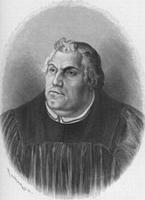 In other words, the Means of Grace are those things through which we receive the benefit of Jesus' suffering and death on our behalf. They are the Gospel Word as proclaimed in the sermon and pronounced in the Absolution, Holy Baptism, and Holy Communion. These establish, grow, and strengthen faith as through them we receive the fulness of the forgiveness of sins, life, and salvation.
In other words, the Means of Grace are those things through which we receive the benefit of Jesus' suffering and death on our behalf. They are the Gospel Word as proclaimed in the sermon and pronounced in the Absolution, Holy Baptism, and Holy Communion. These establish, grow, and strengthen faith as through them we receive the fulness of the forgiveness of sins, life, and salvation.Such sweet and blessed comfort to have concrete and tangible instruments of delivery! God does not leave us to hope, to wish, to imagine, or to feel that we've been forgiven; through His called pastors, by the work of the Holy Spirit, He imparts forgiveness in our ears, upon our flesh, and in our mouths, physically confirming our great spiritual wealth.
 So why did I title this post "The Meanies of Grace" and who are all these stern looking gents peering from the page? I've discovered that proclaiming the Gospel ain't for sissies. The foes of these men certainly considered them "meanies" because they refused to compromise their beliefs or water down the pure, sweet Gospel which was entrusted to their stewardship.
So why did I title this post "The Meanies of Grace" and who are all these stern looking gents peering from the page? I've discovered that proclaiming the Gospel ain't for sissies. The foes of these men certainly considered them "meanies" because they refused to compromise their beliefs or water down the pure, sweet Gospel which was entrusted to their stewardship.While each may, at one time or another, have overstepped propriety and offended enemies (and even friends) with his vigor or vitriol, each also was vitally concerned that the Gospel be preached and taught in its truth and purity and the Sacraments be administered and received according to the word and the will of the Lord.
 Thus, each "thug" appears here because someone didn't like or agree with him and his stance on fidelity to the Faith. Most are familiar with the treatment dealt Martin Luther, with papal bulls, excommunication, and labeling as an outlaw by the Empire. All this because he cut Rome's purse strings, shined the Gospel light on Catholicism's shameful promotion of works-righteousness, and refused to recant his writings unless Scripture proved him wrong.
Thus, each "thug" appears here because someone didn't like or agree with him and his stance on fidelity to the Faith. Most are familiar with the treatment dealt Martin Luther, with papal bulls, excommunication, and labeling as an outlaw by the Empire. All this because he cut Rome's purse strings, shined the Gospel light on Catholicism's shameful promotion of works-righteousness, and refused to recant his writings unless Scripture proved him wrong.His successors, including Matthias Flacius and Martin Chemnitz, likewise had their detractors. While these two meanies were forced to continue contending with Rome, they also faced external challenges from Calvinism, radical reformers, and other non-Lutheran theologies. At the same time, Crypto-Calvinists (those claiming to be Lutheran but holding Calvinist beliefs) constantly warred with them from within the Evangelical camp.
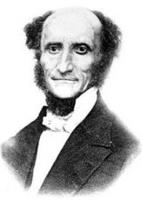 Internal and external struggles didn't end when Lutheranism crossed the Atlantic. By the mid-1800s, much of the American branch of the church had parted theological company with the faith confessed in the Book of Concord. While confessional fidelity existed in some areas, much of the United States knew only the "American Lutheranism" espoused by Samuel Simon Schmucker.
Internal and external struggles didn't end when Lutheranism crossed the Atlantic. By the mid-1800s, much of the American branch of the church had parted theological company with the faith confessed in the Book of Concord. While confessional fidelity existed in some areas, much of the United States knew only the "American Lutheranism" espoused by Samuel Simon Schmucker.Seeking as had the Crypto-Calvinists and others of bygone days to find common denominators between opposing confessions, American Lutheranism often ignored historic doctrinal (and Biblical) differences regarding the Sacraments, conversion, and other essential articles relating to the Gospel. Much of Carl Ferdinand Wilhelm Walther's life in the United States involved uniting Lutherans who subscribed unconditionally to the Confessions while working to root out false teaching, sectarian theology, and Methodist hymnody from the Lutheran Church.
Walther's labors included one of the greatest literary works of Lutheranism, The Proper Distinction between Law and Gospel, an exposition based upon evening lectures at Concordia Seminary, St. Louis. He also contributed at least as much and probably more than anyone else to the formation and early growth of The Lutheran Church — Missouri Synod. Needless to say, Walther's unyielding defense of the Gospel and unbending refusal to compromise on liturgical and unionistic issues alienated many.
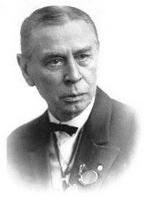 The final rogue pictured in this gallery is Francis Pieper. A gifted theologian, his Christian Dogmatics are still read and studied among Confessional Lutherans. As with the others, we can also make a case for him as a Meany of Grace. For one thing, he absolutely rejected any form of open communion, going so far as to emphasize the point in English in the German text of the Christliche Dogmatik. Pieper was also author of A Brief Statement of the Doctrinal Position of the Missouri Synod, which both clearly expressed Missouri's corporate confession while also informing those who disagreed that they were in the wrong, using such mean and thuggish terminology as "we condemn" and "we repudiate" in rejecting the theological errors of the time.
The final rogue pictured in this gallery is Francis Pieper. A gifted theologian, his Christian Dogmatics are still read and studied among Confessional Lutherans. As with the others, we can also make a case for him as a Meany of Grace. For one thing, he absolutely rejected any form of open communion, going so far as to emphasize the point in English in the German text of the Christliche Dogmatik. Pieper was also author of A Brief Statement of the Doctrinal Position of the Missouri Synod, which both clearly expressed Missouri's corporate confession while also informing those who disagreed that they were in the wrong, using such mean and thuggish terminology as "we condemn" and "we repudiate" in rejecting the theological errors of the time. Of course, these errors never went away. All the old ones — and some that are new — continue to plague Christ's Church. We can never have too many hard-headed theo-thugs who are willing to suffer all for the truth. Yet to be true Meanies of Grace, they must also believe, teach, and confess, the full, pure Gospel.
Of course, these errors never went away. All the old ones — and some that are new — continue to plague Christ's Church. We can never have too many hard-headed theo-thugs who are willing to suffer all for the truth. Yet to be true Meanies of Grace, they must also believe, teach, and confess, the full, pure Gospel.A real Meany of Grace will never sell out, yet will give all he can of himself to love his neighbor and his enemy as himself. A true Meany of Grace won't let you take the Gospel from him, yet will gladly and completely give it to you in all its sin-absolving purity. A Meany of Grace may grate on you as he refuses to be anything other than 100% Lutheran, yet he'll deeply care if you involve yourself in any teaching which denies or obscures any part of Christ's gracious work on our behalf. Thus, I leave a blank open here.
Can you picture yourself, your pastor, or your professors or teachers sitting amongst these thugs, aggravatingly unable to change in faith and practice yet giving, gracious, and loving toward lost and hurting people? If not, why not? If so, click on the comments and let us know.
So you crawled into the clothes closet and all you found were clothes? You visited Narnia years ago and can't get back again? You read (and re-read and re-read) the books, saw the previous film offerings, and are hoping againt hope that the upcoming film will be faithful to C. S. Lewis and to the Gospel heart of Narnia?
With a 9 December release date, more information is coming forth and Christian culture maven Gene Edward Veith has a series of posts at his Cranach blog about the recent screening party, the folks he met there, the film clips he saw, and his evaluation of the film's potential in the marketplace. After you read it all, you may want to pre-order your opening day tickets as an early Christmas present to yourself and your loved ones.
Ah, Narnia! where talking Aardvarks aren't so unusual.
The Deacon Philip, Deacon (also called the Evangelist, see Acts 21:8), was one of the seven men appointed to assist in the work of the twelve Apostles and of the rapidly growing early church by overseeing the distribution of food to the poor (6:1-6).
Following the martyrdom of Stephen, Philip proclaimed the Gospel in Samaria and led Simon the Sorcerer to become a believer in Christ (8:4-13). He was also instrumental in bringing about the conversion of the Ethiopian eunuch (8:26-39), through whom Philip became indirectly responsible for bringing the Good News of Jesus to the people on the continent of Africa. In the town of Caesarea he was host for several days to the Apostle Paul, who stopped there on his last journey to Jerusalem (21:8-15).
Collect
Almighty and everlasting God, we thank you for your servant Philip the Deacon, whom you called to proclaim the Gospel to the peoples of Samaria and Ethiopia. Raise up in this and every land heralds and evangelists of your kingdom, that your Church may make known the immeasurable riches of our Saviour Jesus Christ, who lives and reigns with you and the Holy Spirit, one God, now and forever.
Dr. Gene Edward Veith now has the Cranach Institute up and running as part of the World Magazine suite of blogs. I welcome the good doctor to yet another expenditure of time on our behalf and encourage the Alley's denizens to favor him with your readership.
Rev up your motor and head on over to Full Throttle & and Emptly Gas Tank, where you'll find the latest edition of the Lutheran Carnival.
Karl has more than two dozen interesting, often thought-provoking entries reading for your dining and dancing pleasure.
 A recent report I read states that when investigations involving Hurricane Katrina conclude, the Army Corps of Engineers may find the biggest finger of blame pointing at itself. Preliminary data shows that the Corps may have mismeasured and misinterpreted data concerning the depth to which New Orleans had already sunk and the rate at which it was still sinking. According to the report, the last major rebuilding of the levees may have left them two feet lower relative to the surrounding water than called for in the specs.
A recent report I read states that when investigations involving Hurricane Katrina conclude, the Army Corps of Engineers may find the biggest finger of blame pointing at itself. Preliminary data shows that the Corps may have mismeasured and misinterpreted data concerning the depth to which New Orleans had already sunk and the rate at which it was still sinking. According to the report, the last major rebuilding of the levees may have left them two feet lower relative to the surrounding water than called for in the specs.However, while the Corps may be culpable in the New Orleans disaster, it certainly doesn't keep all the blame for itself. Various levels of government all failed to acquit themselves well while the residents certainly compounded problems by staying in a below-sea levl basin while a powerful hurricane was pointing itself directly at them.
And speaking of the people (and the Corps of Engineers), if the builders and inhabitants of the Crescent City have done anything well, they've wonderfully illustrated Jesus' parable on the building of the two houses (Matthew 7:24-27).
There is no "rock" supporting New Orleans' soft, silty surface — dig down a thousand feet and you'll still be shoveling sand. For the hundreds of years people have settled there, the ground's been settling underneath them. All their building has been on an insecure base.
Many who don't live there, who didn't grow up below sea level, cannot comprehend why people continued to stay in the Big Easy. Yet when we look at our own lives, isn't there evidence that we've joined them in a similar manner? Indeed, what we do with our lives is potentially much more dangerous than building houses on a river delta in the center of hurricane country.
The worst thing that can happen to houses of lumber, brick, or stone built on unsuitable soil is that when rains fall, floods come, and winds blow and beat against them, they'll fall. The worst thing that happens to a person whose life is built on anything other than Christ is that when the storms of life rage against them, they'll perish eternally. The fall of human housing can be undone; wreckage can be rebuilt. But when a person dies in his trespasses, there's no government grant, no insurance policy, no helpful contractor ready to put things back together: Death is final and hell eternal.
Jesus said, "Everyone then who hears these words of mine and does them will be like a wise man who built his house on the rock. (Matthew 7:24)" Of what words was our Lord speaking? This parable closes the Sermon on the Mount, so we should consider it in that context. Particularly, they immediately follow the section beginning, "Not everyone who says to me, 'Lord, Lord,' will enter the kingdom of heaven, but the one who does the will of my Father who is in heaven. (7:21-23)" Ultimately, the will of the Father is to save sinners who believe in His Son. As Jesus stated in John 6:38-39, "I have come down from heaven, not to do my own will but the will of him who sent me. And this is the will of him who sent me, that I should lose nothing of all that he has given me, but raise it up on the last day."
Thus, building upon the Rock who is Christ (see 1 Corinthians 10:4) means believing that He lived, suffered, died, and rose to take away our sins, reconcile us to His Father, and bring us to eternal life with God. When we do this, we are solidly grounded against any of life's storms, no matter how savage. No one — not even Satan — can tear us from the Son's loving hands for no one can tear us from the hands of His Father (John 10:28-29).
Our hymnody confesses this secure foundation in many beloved songs. Among them are The Church's One Foundation, Who Trusts in God a Strong Abode, Christ Is Our Cornerstone, and Built on the Rock the Church Doth Stand.
All Bible quotes ESV.
 Moving from the Old World to the New, H. M. Muhlenberg established the shape of Lutheran parishes and Lutheranism in general in America during a 45-year ministry in Pennsylvania. Born at Einbeck, Germany, in 1711 and baptized Heinrich Melchior Mühlenberg, he came to the American colonies in 1742.
Moving from the Old World to the New, H. M. Muhlenberg established the shape of Lutheran parishes and Lutheranism in general in America during a 45-year ministry in Pennsylvania. Born at Einbeck, Germany, in 1711 and baptized Heinrich Melchior Mühlenberg, he came to the American colonies in 1742.A tireless traveler, Muhlenberg helped to found many Lutheran congregations and was the guiding force behind the first American Lutheran synod, the Ministerium of Pennsylvania, established in 1748. He valued the role of music in Lutheran worship (often serving as his own organist) and was also largely responsible for preparing the first American Lutheran liturgy (also in 1748).
We remember Muhlenberg as church leader, journalist, liturgist, and — above all — as faithful pastor to those in his charge. He died in 1787, leaving behind a large extended family and a lasting heritage: American Lutheranism.
Collect of the Day
Heavenly Father, Shepherd of your people, we thank You for Your servant Henry Melchior Muhlenberg, who was faithful in the care and nurture of Your flock; and we pray that, following his example and the teaching of his holy life, we my by Your grace grow into the stature of the fullness of our Lord and Savior Jesus Christ; who lives and reigns with You and the Holy Spirit, one God, now and forever.
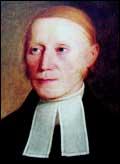 The early Church entrusted some women, particularly widows, with helping to carry out the "social work" of the Church, particularly caring for the sick and needy of the congregation. From reading 1 Timothy 5:1-16, it appears that certain of these women were specially consecrated and made a lifetime commitment to works of mercy. The idea of a female deaconate or service order largely died out by the 7th Century AD, although some groups of nuns and a few informally organized groups undertook similar work.
The early Church entrusted some women, particularly widows, with helping to carry out the "social work" of the Church, particularly caring for the sick and needy of the congregation. From reading 1 Timothy 5:1-16, it appears that certain of these women were specially consecrated and made a lifetime commitment to works of mercy. The idea of a female deaconate or service order largely died out by the 7th Century AD, although some groups of nuns and a few informally organized groups undertook similar work.The modern deaconess movement came mainly through the work of Theodor Fliedner, a German Lutheran. Born in Eppstein, Germany, in 1800, he became pastor of a small parish in Kaiserswerth in 1821 or 1822. Fliedner took the work of England's Elizabeth Fry and Dutch Mennonites as inspiration. Encountering Moravian deaconesses, he also drew from their example.
He began serving the Düsseldorf Prison, walking to and from Düsseldorf on alternating Sundays until the appointment of a regular prison chaplain. This led to more prisons engaging chaplains and establishing regular worship and aid services for the prisoners. He envisioned and opened a nursery school; eventually it became a sort of teachers' college and a starting point for what would become his first deaconess school.
Becoming more involved in Christian social work among the disadvantaged, Fliedner convinced himself that he should revive the order of deaconesses. He opened a hospital and deaconess training center in Kaiserswerth on 13 October 1836. Florence Nightingale heard of his reputation, visited the school in the 1840s, came back to study nursing, and graduated in 1851.
The program was so successful that he could send deaconesses to other hospitals by 1838. New deaconess motherhouses grew up in Pittsburgh, Pennsylvania and in Jerusalem, Paris, Berlin, and Strasbourg, and elsewhere. When he died, 30 motherhouses already stood and over 1500 deaconesses served around the world. The middle of the 20th century saw more than 35,000 deaconesses serving world-wide.
Lutherans in the United States may also want to remember William Passavant, who pioneered the American deaconess movement in 1849. He also founded missions, hospitals, orphanages, and schools. Passavant died 3 January 1894.
Additional information available from Wikipedia and James Kiefer.
Posted in special honor of my dear Ste. Em.
 Today we celebrate a man some probably consider the Dr. Dolittle of the Sanctorial Calendar. Yes, it's the commemoration of Francis of Assisi, the guy most think of as taking preaching the Gospel to all creatures to mean all creatures, including the birds and the bunnies. Yet behind some known eccentricities and the misconceptions of later generations, we find a gentle yet strong-minded individual who forsook earthly wealth in favor of the true treasure of heaven.
Today we celebrate a man some probably consider the Dr. Dolittle of the Sanctorial Calendar. Yes, it's the commemoration of Francis of Assisi, the guy most think of as taking preaching the Gospel to all creatures to mean all creatures, including the birds and the bunnies. Yet behind some known eccentricities and the misconceptions of later generations, we find a gentle yet strong-minded individual who forsook earthly wealth in favor of the true treasure of heaven.Baptized Giovanni Bernardone in Assisi, Italy in 1181, this son of wealthy cloth merchant Pietro Bernardone became known as "Francesco." Speculation continues as to the origin of the replacement name. Some claim that it came soon after birth from his father, who'd from a trip to France; another account credits his early mastery of the French language. However, I think the best explanation I've heard is that he took or was given the name because of a deep affection for French literature and culture, especially the Troubadors.
After rejecting family wealth and renouncing his inheritance, he began a the life of a mendicant, or beggar. Slowly he attracted others to himself and a life of complete renunciation of earthly possessions. Pope Innocent III granted a charter to Francis and his followers, allowing the formation of the Order of Friars Minor.
If Francis suffered in poverty, he may have suffered even more as the leader of a recognized monastic order. Loose rule was replaced with rigid constitution and dissent sometimes arose over staying the course versus either relaxing or increasing the severity of the order's strict standards and vows.
Francis is rightly remembered as a man who passionately defended and wholeheartedly worked to uplift the poor in body or spirit. However, modern scholars pretty much agree that he wasn't always going about talking with the animals. While he considered that the created universe was good and offered God praise in and of itself, he didn't seem to adhere to many of the tenets ascribed to him by many environmentalists, animal "rights" activists, and sentimentalists of various stripes.
His later years finally brought a degree of solace as he was able to embark upon a brief period of hermitage, fasting, meditation, and prayer. He returned to Assisi prior to his death and large crowds made pilgrimage. Historians suspect that while some came to pay honor or receive spiritual blessing, others lurked hoping to be part of any division of his remains as relics.
Two years after his death, Pope Gregory IX, the former cardinal-protector of the order, canonized Francis.
"Of Assisi," yes … "a sissy," nope … he was one tough Little Brother.
Hurry over to What You Do, Do Quickly, which is "for fair-weather Lutherans, faint-hearted Lutherans, and Lutherans who just don't want to be Lutheran."
Cooks a three-minute argument in two minutes flat.

